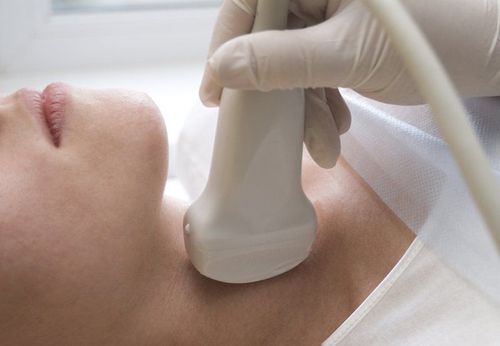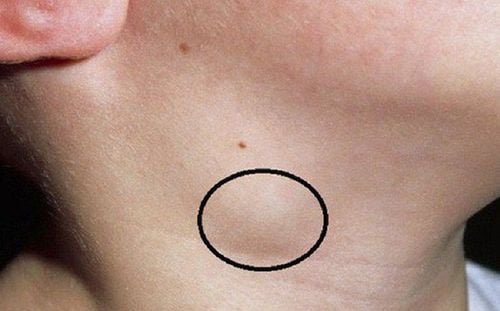This is an automatically translated article.
The thyroid gland is an organ of the endocrine system, located in the front of the neck, it produces two main hormones, T3 and T4, that regulate the activities of several organs in the body. When Hashimoto's thyroiditis will lead to unpredictable consequences.1. What is Hashimoto's thyroiditis?
Hashimoto's thyroiditis, also known as Hashimoto's disease, is an autoimmune disease, caused by a disorder of the immune system that turns against the body's own tissues. In Hashimoto's disease, the main tissue is the thyroid gland, which leads to hypothyroidism, a condition in which the thyroid gland fails to produce the hormones the body needs.
Features of Hashimoto's thyroiditis:
Thyroid infiltrate many lymphocytes, thyroid fibrosis, thyroid cell atrophy, and strong eosinophils appear. This is a chronic inflammatory manifestation of lymphocyte infiltration.
2. Signs of Hashimoto's Thyroiditis
Hashimoto's thyroiditis has many symptoms, but none of them are specific. The disease usually progresses silently, over the years leading to hypothyroidism. By the time the signs of the disease are recognized, the majority of patients are already in a state of hypothyroidism. Therefore, the signs of the disease mainly come from hypothyroidism:
Fatigue at intense intensity, fear of cold, severe constipation Dry skin, paleness, round face, hoarseness Unexplained weight gain despite loss of appetite Muscle pain, stiffness in the shoulder and thigh For women, menstrual disorders, usually menorrhagia

Tình trạng rối loạn kinh nguyệt có thể gặp ở nữ giới
Depression, drowsiness In particular, the thyroid gland is often enlarged or shrunk Memory is reduced, activity slows down
3. Subjects susceptible to Hashimoto's thyroiditis
Epidemiological records show that Hashimoto's thyroiditis is becoming more and more common, the frequency tends to increase. The disease occurs more often in women, up to 90%. It can occur at any age, but is most common between the ages of 30 and 60, and there is a familial factor.
The disease can occur with a number of other autoimmune diseases such as: pernicious anemia, diabetes, atrophy of the adrenal glands, cirrhosis of the liver, myasthenia gravis, rheumatoid arthritis, premature graying of hair, ovarian failure.
4. Complications of Hashimoto's Thyroiditis
Hashimoto's thyroiditis is an extremely dangerous disease that can affect a lot of patients' health, causing many complications such as goiter, cardiovascular disease, neuropsychiatric, myxedema, and possibly malformations. congenital during pregnancy. Therefore, if the disease is not treated quickly and thoroughly, it will cause serious consequences.
Hình ảnh người bệnh bị bướu cổ do biến chứng của bệnh viêm tuyến giáp Hashimoto
5. Causes of Hashimoto's thyroiditis
To this day, Hashimoto's thyroiditis has not been officially identified, but there are many factors thought to be the cause of the increasing number of patients with this disease:
Genetics: Patients with the disease often have a family history. Hormones: affect women 7 times more than men, so sex hormones also play a decisive role in the cause of the disease. In particular, some women still suffer from disease in early pregnancy. Iodine is excessively allowed. Radiation exposure: there are some reports that thyroiditis is increased in exposed patients. radiation exposure, such as the bomb explosion in Japan, or people receiving radiation therapy for blood cancer
6. Method of diagnosing Hashimoto's thyroiditis
In addition to relying on the signs of disease outlined above, doctors can also use blood tests to measure thyroid hormone and thyroid-stimulating hormone levels to make a diagnosis:Hormone tests: Mainly measure the levels of hormones produced by the thyroid gland. If the thyroid gland is underactive, then the levels will be low and vice versa. Antibody testing: Because thyroiditis is an autoimmune disease, it involves the production of antibodies, such as thyroid peroxidase antibodies. Thereby, the doctor also partly knows what state the patient's thyroid is in.

Một số xét nghiệm giúp bác sĩ chẩn đoán bệnh viêm tuyến giáp Hashimoto
7. Hashimoto's Thyroiditis Treatment Methods
Treatment of Hashimoto's thyroiditis depends on the patient's hypothyroidism. Currently, there is no cure for Hashimoto's thyroiditis. The most commonly used method today is to replace it with synthetic thyroid hormone, a drug that is similar in structure and effect to the natural hormone produced by the thyroid gland. It is a drug L.Thyroxin to inhibit and correct hypothyroidism. Usually after some time, the patient will feel better, but for complete improvement of symptoms and tests (T4, THS, Cholesterol,...) it takes 3-6 months. But when the patient has hypothyroidism, the patient can only take hormone replacement therapy for life.
Use propranolol only when the condition improves. Before taking the drug, the doctor will depend on your age, weight, and disease severity to give the right amount of medicine. As for the case of surgery, there are very few indications, only when the goiter is very large, there are no signs of collapse.
Thyroiditis is a very dangerous disease, so patients should go for regular check-ups to control their condition well.
Currently, at Vinmec International General Hospital system, there are screening and screening services for thyroid diseases to help customers detect diseases early and treat them effectively. When examining and screening for thyroid disease, customers will receive:
Examination and consultation with an Endocrinologist. Thyroid ultrasound. Screening tests for thyroid diseases: FT3, FT4, TSH, Anti – TPO, Anti TG. Return the results and consult with the doctor. To register for examination and treatment at Vinmec International General Hospital, please book an appointment on the website for service.
Please dial HOTLINE for more information or register for an appointment HERE. Download MyVinmec app to make appointments faster and to manage your bookings easily.













